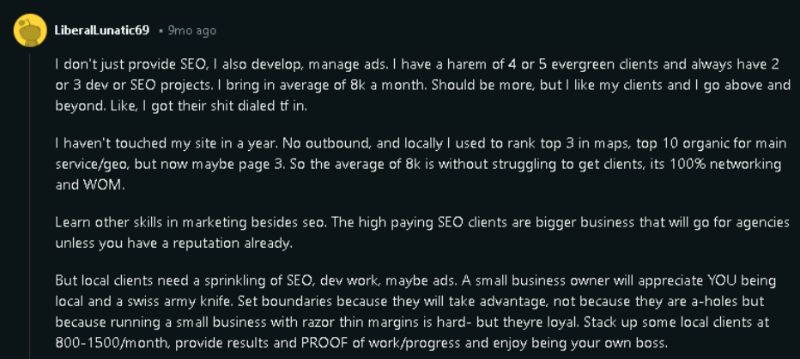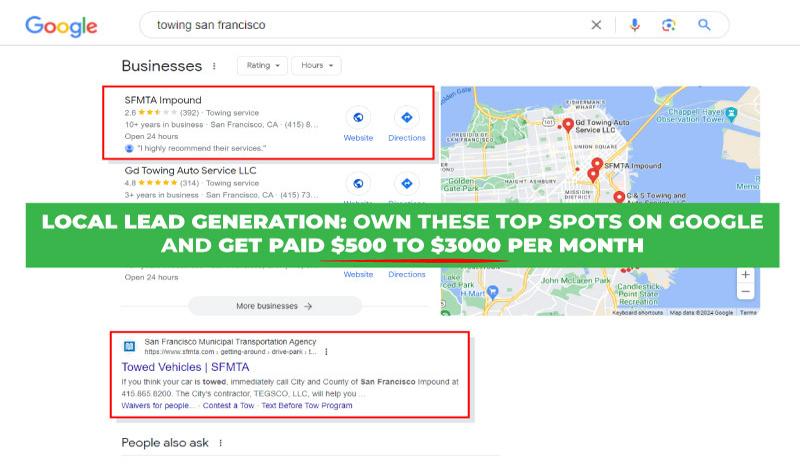13 Ways To Make Money With SEO in 2025? (PLUS 5 Tips To Create a Profitable SEO Side Hustle)

The top ways to make money with SEO in 2025 are:
- Start a local lead generation service for small businesses.
- Offer freelance SEO consulting to clients.
- Teach SEO through an online course.
- Monetize a high-traffic blog or website.
- Build an SEO agency.
- Charge for keyword research and planning.
- Build backlinks for clients.
- Conduct SEO audits and give recommendations.
The profitability of SEO is undeniable, with professionals in the field reporting annual earnings from freelance consulting to agency ownership between $30,000 to over $100,000, depending on the scale and success of their operations. SEO services are easy to sell because they have high ROI, especially for businesses seeking to upgrade their digital marketing strategies. Individuals like Neil Patel of NP Digital and Rand Fishkin of Moz have built lucrative careers and businesses by specializing in SEO.
Nathan Gotch, an SEO professional and co-founder of Rankability, says that the best way to make money with SEO is by starting a niche SEO agency. Focusing on a specific industry allows for lower competition, which makes it easier to attract and retain clients. For example, an SEO which focuses on lawyers can reportedly earn $10 million per year. However, developing deep expertise in a specific niche requires significant investment in learning. SEO beginners may find it hard to keep up.

Search Engine Optimization (SEO) is the process of optimizing your website to increase its visibility on search engine results pages. According to Statista, Google is the most used search engine in the world. By optimizing for relevant keywords, businesses increase their online presence. They attract more traffic and potential customers. According to BrightEdge Research, SEO drives 1,000%+ more traffic than organic social media.
SEO is highly profitable and scalable because of its ongoing demand. Many businesses seek SEO experts to boost their online presence, acquire high-value leads, and drive sales. I run a local SEO business for over 10 years now. So I know what the top ways are to monetize your SEO skill.
This article guides you through various strategies to make money with an SEO business in 2025, including critical steps for beginners and insights into the most profitable niches. From starting a local lead generation service to selling your own SEO tools, we cover the essentials for building a lucrative SEO enterprise.
1. Start a Local Lead Generation Service for Small Businesses.
Local lead generation helps small businesses get noticed online. It increases their chances of attracting customers in their area. To start, identify local businesses lacking online visibility but with a high potential to attract more customers. Optimize their online presence through strategies like Google My Business listing optimization. Use local SEO to identify profitable keywords. Create dedicated landing pages for local audiences.
Charge potential clients for these services on a per-lead basis or through a monthly retainer. According to LeadsHook, you can charge $20 to $500 per lead. The price of a lead varies based on several factors. These include specific market niches, the quality of the leads, and the type of clients being targeted.

2. Offer Freelance SEO Consulting to Clients.
SEO consulting is the service of providing expert advice on how to optimize websites to rank higher in search engine results. As a freelance SEO consultant, start by defining your niche and services. According to SEO Hustlers, the top profitable SEO niches in 2023 are baby clothing, cryptocurrency, and vaping.
Then, market your services on platforms like Upwork or Fiverr. Conduct initial SEO assessments for your clients. This involves analyzing their website’s current SEO performance. This includes keyword usage, site structure, content quality, and backlink profile.
Offer strategies for improvement and ongoing optimization. These could be strategies focusing on high-quality content creation, enhancing website speed and mobile usability, and building authoritative backlinks. Start with competitive pricing aligned with the market and your experience level. Then, gradually increase once you gain more clients and success stories.

3. Teach SEO Through an Online Course.
According to LinkedIn and SEMrush, SEO specialists are in high demand. Offering an SEO course online meets this demand and create a new income source. First, begin by choosing a teaching platform. Some popular ones are Udemy, Teachable, and Skillshare, which have user-friendly interfaces. They also have extensive reach to potential students. You should also define your target audience and structure your curriculum to cover essential SEO concepts.
Focus on practical SEO techniques with real-world examples for your content. Promote your course through social media, SEO blogs, and email marketing. Engage students by incorporating interactive quizzes, assignments, and a community forum for discussions. Regularly update the course to reflect the latest SEO trends, ensuring your SEO training remains relevant and valuable.
4. Monetize a High-Traffic Blog or Website.
This means converting a site’s visitor count into revenue. Use strategies like advertising, affiliate marketing, or selling products. Understand your audience to tailor SEO content and content marketing strategies. One popular service to offer is content syndication, where you make content available from one website to another.
Choose the right monetization strategy by selecting methods that align with your audience’s interests and the content of your blog posts or website. Maintain the integrity and quality of your blog posts and website content. Do this through consistent efforts in research to ensure factual accuracy.
5. Build an SEO Agency.
This involves setting up the foundational aspects of the business. It includes creating a business plan, determining your service offerings, setting up legal structures, and establishing your brand identity. Next, recruit skilled professionals in SEO strategy, social media, and digital marketing. Find clients through networking. Use social media to showcase your expertise.
Some challenges of scaling an agency include managing an increased workload, maintaining service quality, and finding the right talent. Address these drawbacks by investing in training. Implement scalable processes and automation tools. Manage client expectations with clear communication from the outset. Also, have realistic timelines for achieving results and regular updates on progress.
Price your SEO services by:
- assessing your expertise and experience to set a competitive yet fair market rate.
- considering the project’s scope and complexity to tailor your pricing.
- offering different pricing models (hourly, project-based, or retainer) to accommodate diverse client needs.
- researching competitor pricing so that your rates are in line with industry standards.
- regularly review and adjust your pricing based on feedback, results delivered, and market demand changes.
6. Charge for Keyword Research and Planning.
This service entails using specialized tools to identify high-value keywords that align with your client’s goals. Use tools like Ahrefs, SEMrush, Google Keyword Planner, and Moz Keyword Explorer. They help identify high-value keywords by analyzing metrics such as search volume, competition, and relevance.
Package this service by considering the complexity of the research and the potential ROI it offers. Also, consider including content gap analysis to your services for a full-scale package. This should set your pricing accordingly. Tailor your offerings to include basic research for smaller projects or in-depth analysis for larger, more competitive markets.
7. Build Backlinks for Clients.
Building backlinks means creating links from other websites to your own. This helps improve the site’s search engine ranking by increasing its authority and relevance in the eyes of search engines. As an SEO expert, employ ethical strategies and create high-quality content that others want to link to. Engage in guest blogging on reputable sites. Use broken link building to offer replacements for dead links on other websites. Always prioritize the relevance and authority of linking sites to ensure the backlinks contribute positively to your SEO efforts.
Differentiate your service by the quality of links and the effort involved. Price this service based on the strategic value of the backlinks generated. This ensures website owners receive a tangible improvement in their site’s SEO performance. Also, offer link reclamation services to keep clients’ websites up-to-date.
8. Conduct SEO Audits and Give Recommendations.
An SEO audit is a comprehensive review of a website to identify areas for improvement in search engine optimization. It covers technical SEO aspects, on-page optimization like content and keywords, and off-page factors such as backlinks. With your SEO knowledge, you can assess site structure, content quality, and backlink profile to identify improvement areas.
Present findings and recommendations from an SEO audit in a clear, structured report. Highlight key areas for improvement, potential impact, and concrete steps. Price the audit based on its complexity, the size of the client’s business, and the depth of analysis required.
To start offering this service, build on your technical SEO expertise. Familiarize yourself with the latest audit tools, schema markup implementation, and develop customizable templates for reporting to streamline the process for different client needs.
9. Sell Your Own SEO Tools and Software.
This involves identifying unmet needs within the SEO tool market. You should develop a software solution and market it. According to Zapier, some of the best SEO tools in the market are seoClarity, Surfer (which starts at $89/month), and SEMrush (which starts at $129.95/month).
When selling your own SEO products, you should set a competitive price model. Implement strategic marketing like content marketing through SEO blogs and industry publications. Provide excellent customer service through setting up a responsive helpdesk. It also helps to provide FAQs and tutorials. Implement a feedback loop for user suggestions and provide regular updates and bug fixes.
10. Use E-Commerce SEO To Sell Products.
Starting an e-commerce store and using seasonal SEO significantly increases product visibility and sales during peak shopping times. Optimize your e-commerce site by conducting keyword research for product pages. Use tools like Google Keyword Planner, Ahrefs, SEMrush, Moz Keyword Explorer, and Ubersuggest. Streamline your site architecture for easy navigation and enhance the user experience. Adjust your strategies by using Google Analytics to track performance.
Integrate social proof and reviews on your e-commerce site by featuring customer testimonials on product pages. Include a review section where customers can rate products and leave comments. Use plugins or widgets that pull reviews from third-party platforms. Highlight user-generated content, such as photos of customers with your products.
11. Work as an SEO Specialist for a Company.
Working as an SEO specialist for a company involves managing and implementing SEO strategies. You help the company improve its search engine rankings, traffic, and online presence.
To be an in-house SEO specialist, you need a strong understanding of SEO practices. It’s also essential to be proficient in keyword research. You should also know about Google Analytics and other SEO tools. Usual qualifications may include a degree in marketing, communications, or a related field. Companies may also require you to have experience in SEO and digital marketing.
This is good for those preferring a structured environment. It offers a chance to deepen SEO expertise within an industry setting. Seek opportunities on job boards, company websites, and through networking. Employers value proven SEO success, technical knowledge, and strategic thinking. Responsibilities often include optimizing website content, conducting keyword research, and analyzing performance data to refine SEO strategies.
12. Become an SEO Writer.
An SEO writer creates content optimized for search engines. In this service, you use keyword research to write articles that rank well on Google and other search engines. To become an SEO copywriter, you need to master SEO principles and conduct keyword research. You should also craft content that’s both engaging for readers and optimized for search engines.
Look for writing opportunities on freelance platforms such as Upwork, Freelancer, and Fiverr. Content mills and job boards like ProBlogger and Contena often list opportunities for SEO writing. Set rates based on your experience and the project’s complexity. Work closely with clients to understand their content goals. This ensures your SEO copywriting meets their needs.
13. Promote SEO Products and Services as an Affiliate.
Promoting SEO products and services as an affiliate involves partnering with providers to offer their services under your brand. This service entails using affiliate marketing techniques. After identifying and establishing partnerships with SEO service providers, negotiate the terms of reselling their services. Then, brand these offerings as part of your portfolio. Offer SEO solutions to your clients without having to do it yourself.
To choose providers, evaluate their reputation, the effectiveness of their services, and their compatibility with your brand. Set up pricing structures by marking up the provider’s rates to cover your commission. Market these services to your client base by highlighting their benefits. Use your established communication channels. Leverage content marketing strategies to showcase success stories or case studies. This model doesn’t require extensive SEO knowledge since you’re selling products from other creators.
5 Tips To Create a Profitable SEO Side Hustle
- Get reviews and testimonials from SEO clients. Build a strong portfolio to boost your credibility. To collect feedback, directly ask satisfied clients to share their experiences. Offer options like Google Forms or direct submissions on your site. Leverage positive reviews in your marketing materials by featuring them on your website, in Google Ads campaigns, and across social media platforms.
- Automate your SEO workflow. Use tools like SEMrush and Ahrefs to streamline SEO tasks. Examples of tasks that can be automated include keyword research, SEO audits, and rank tracking. This saves time and increases efficiency. You get to handle more clients or focus on strategy development.
- Host free SEO webinars or workshops. This way, you attract potential clients by showcasing your expertise and establishing authority in the field. To select topics, focus on current SEO challenges or trends that address your target audience’s needs. Promote your events through social media, email marketing, and SEO communities. Engage attendees by providing valuable insights. Follow-up with personalized offers or consultations to convert them into clients.
- Partner with web designers and developers. Offer all-inclusive digital marketing solutions. These collaborations ensure that websites are visually appealing and optimized for search engines. Handling the logistics of collaboration and revenue sharing involves clear communication of roles. You should also set mutual goals and agree on a fair distribution of earnings based on each party’s contribution. This synergy leads to higher client satisfaction and opens up new business opportunities.
- Set up an SEO referral program. This increases your client base by using your current clients’ networks. Consider offering incentives like discounts on future services or a flat referral fee for each new client brought in. Implement a simple mechanism for tracking referrals, such as referral codes or links. This ensures clients are rewarded for their efforts in bringing new business to you.
What are the Most Profitable SEO Niches for Beginners?
- Local Services. Tailoring SEO to local legal or dental services involves optimizing for geo-specific keywords and Google My Business listings. Focus on local search optimization and collecting positive online reviews to improve visibility.
- Hobbyist Topics. For areas like gardening or model building, creating in-depth, authoritative content that covers niche subjects attracts a dedicated audience. Use long-tail keywords to capture specific search queries.
- Emerging Technologies. Covering fast-growing areas like VR or drones, staying ahead with the latest trends, and offering cutting-edge insights set you apart. Regularly update content to remain relevant and authoritative.
- Specialized E-Commerce. Selling unique products like organic skincare requires SEO content that highlights the item’s benefits and sustainability aspects. Target keywords that reflect the unique selling points of the products.
- Health and Wellness. Addressing niches like mental health or fitness for specific conditions means providing reliable, research-backed information. Ensure website content is structured to answer common queries in the niche. Use schema markup for enhanced SERP features.
How Much Money Can You Make With SEO in 2025?
You can make $20,000 or more per year with SEO in 2025. Industry research from Ahrefs indicates that the average media salary of SEO specialists sits at $49,211 per year. Self-employed SEO consultants earn $60,232.
Adam Enfroy is a blogger and co-founder of Income Growth Network from Orlando, Florida, USA. He previously worked as an SEO specialist for Alliance Franchise Brands. Adam says that starting an SEO agency can bring you in $10,000 monthly or more. He adds that the earning potential could reach up to $50,000 to $100,000 yearly if you focus on getting high-paying clients. Adam claims that an SEO agency is scalable and allows you to charge premium rates even as a beginner.

Julian Goldie from Manchester, England, UK runs Goldie Agency, an SEO link building company that provides whitehat backlinks for businesses to drive more search engine traffic. His strategy elevated his income to $4,000 a month and enabled him to scale his agency. He now has over 70 employees. Julian shares that he has made $1.6 million from his SEO agency.

This Reddit user says that he makes an average of $8,000 monthly as a freelance SEO specialist, without struggling to get clients. The user also develops and manages ads. By focusing on a few evergreen clients, he is able to retain loyal clients and earn $800 to $1,500 for each.

SEO is a good way to make money. According to SEMrush, it remains as a critical component of digital marketing in 2025. While the techniques may change, the need for optimizing for search engines will remain constant. So, there will always be a demand for SEO, from individuals to large businesses.
Why Local Lead Generation is the Best Way To Make Money With SEO
Local lead generation is the best SEO business model because it’s a good way to make predictable and sustainable passive income. It has relatively lower risks compared to other SEO business models. Unlike building an SEO agency or selling online courses, you don’t need significant initial investment and upfront work. Plus, you don’t rely on individual sales or client acquisition.

Local lead generation helps businesses get found online by people in their area who are looking for specific services. It uses SEO to make sure that business shows up in the results when someone searches for a service nearby. This way, they get more potential customers through high-quality leads.
It costs about $500 to start a lead gen business, but the profit margin can reach up to 85% to 95%. I’ve been earning over $50,000 monthly through local lead gen services. Plus, I get to do the things I love with important people in my life.

Follow Me
Ippei Kanehara
Founder/CEO
$52K per month providing lead generation services to small businesses
Ippei.com is for digital hustlers, industry leaders and online business owners.
His #1 online business recommendation in 2024, is to build your own lead generation business.
